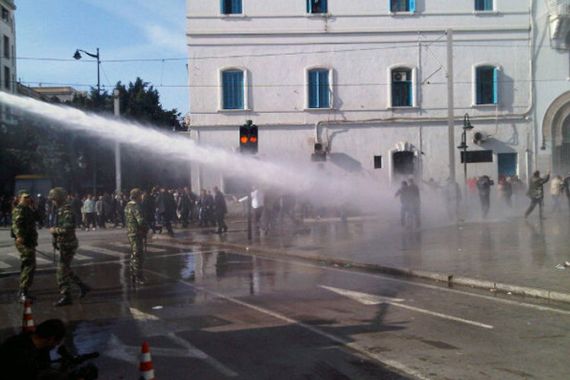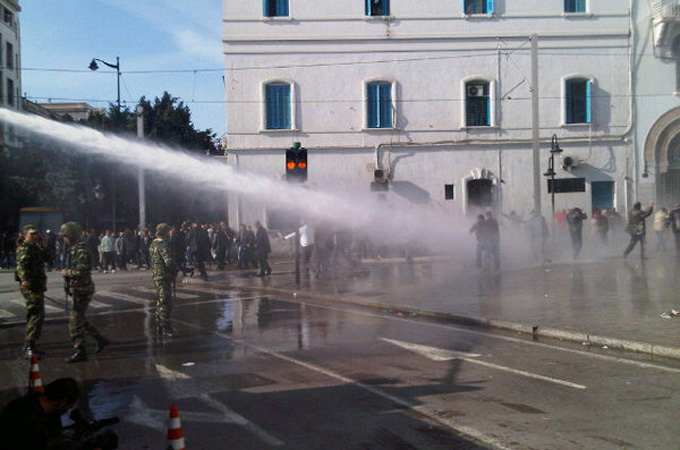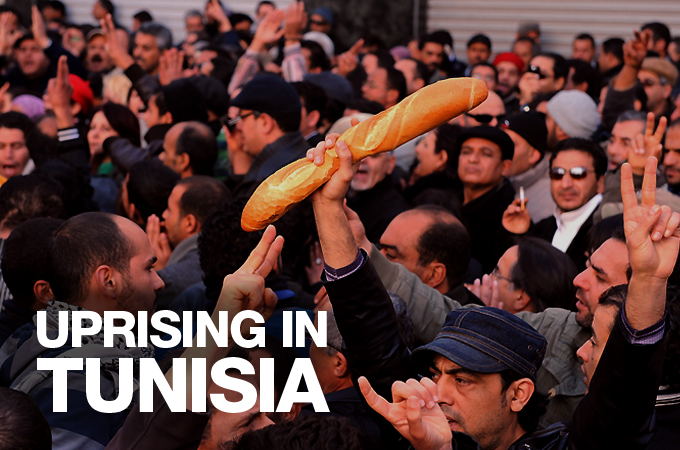Tunisians await new government
Protesters angry at prospect of ousted president’s allies in the new unity government, due to be announced soon.

Tunisian authorities are struggling to stop violence while politicians try to cobble together a unity government after the toppling of Zine El Abidine Ben Ali as president.
Mohamed Ghannouchi, the prime minister, promised to announce a new coalition government on Monday, hoping to maintain the momentum of political progress to ward off fresh protests and also undercut those loyal to the ousted president.
 |
| The army fired water canons at protesters who are against ‘old guard’ in new government [Ayman Mohyeldin] |
Masoud Romdhani, a trade union activist, told Al Jazeera that clashes took place through the night between the army and security forces loyal to Ben Ali.
“I could not sleep last night because of the shooting,” Romdhani said, adding that by the morning things had improved and he was surprised to see people out in the streets and trying to clean things up.
In the heart of Tunis, the army fired water canons at hundred of protesters, Ayman Mohyeldin, Al Jazeera’s correspondent reported from the capital on Monday.
“What began this morning with a few dozen protesters outside the workers union grew and gained momentum,” he said.
“More and more people joined, calling for the collapse of a national unity government that contains elements of the old guard. The army allowed the protesters to move and speak freely, but do not want them to move into certain areas.”
Mohyeldin said that the army had brought in reinforcements while military helicopters flew above to monitor the situation.
New government
People were hopeful to hear any announcements on the new government, as well as possible elections that need to happen within 60 days according to the constitution.
 |
| Follow Al Jazeera’s complete coverage |
“Tomorrow we will announce the new government which will open a new page in the history of Tunisia,” Ghannouchi said on Sunday.
Al Jazeera has learnt that the Democratic Progressive Party and the Democratic Forum for Labour and Freedoms will have one minister each in the proposed coalition.
While the technocrats in the current government are likely to retain their posts, representatives from trade unions and lawyers’ groups are also expected to find cabinet berths.
“We know the incoming national unity government will have three members of the opposition. It will include some technocrats, independents and economists and some figures from Tunisian labour and trade unions. Some of those have still to be determined,” Ayman Mohyeldin, Al Jazeera’s correspondent reported from the Tunisian capital.
“There are some unconfirmed reports that the current interior minister and foreign minister will stay in their positions and that obviously is already drawing some criticism here, with some of the pundits at least criticising the incoming national unity government for not being broad enough in its scope to reflect the political aspirations of the Tunisian people.”
Rashid al-Ghannouchi (no relation to Mohamed Ghannouchi), the exiled Leader of the Nahdha Movement party, told London-based Asharq Alawsat newspaper that leaders of his party had not been invited to participated in the negotiations in forming the new unity government.
Ghannouchi said he believed there was “deliberate alienation to Islamists in Tunisia”. But he added that “If we were invited in the future for taking part in the government, we would consider the offer”, he said.
Ben Ali loyalists
Ben Ali, who had been in power since 1987, fled to Saudi Arabia on Friday following mass protests against his government.
Fouad Mebezaa, the speaker of parliament, was sworn in as the country’s interim president on Saturday and promised to create a unity government that could include the long-ignored opposition.
A gun battle erupted on Sunday around the presidential palace in Carthage on the Mediterranean shore, while in the capital, Tunis, at least two major firefights broke out – one close to the central bank building, the other near the headquarters of the main opposition party, the Progressive Democratic Party (PDP).
In a statement, the PDP said that police and military stopped a car carrying armed men, who it described as foreigners, after which shots were fired.
Separately, security forces killed two armed men stationed on a rooftop near the central bank, a state TV reporter said from the scene.
A military official told the TV station that the men were killed by fire from a helicopter.
Presidential guards loyal to Ben Ali were involved in the shootout in Carthage, about 15km north of Tunis, according to two residents.
The clashes broke out in the afternoon and were marked by sporadic but heavy gunfire, forcing local residents to barricade themselves inside their homes.
Reuters reported, quoting a military source who did not want to be identified, that people loyal to the arrested head of Ben Ali’s security force had opened fire as they passed near the front of the presidential palace.
“Special military groups came out [from the palace] to pursue them and they started to exchange fire,” the source said.
Distrust of police
Al Jazeera’s James Bays, reporting from Tunis on Sunday, said even though army roadblocks had sprung up throughout the city, people were saying they needed to arm themselves against the police, who they did not trust.
|
|
“In between the roadblocks, we were coming across large groups of people who had their own home-made weapons, axes and steel bars, and some of them were not particularly friendly to us when we wanted to film in the area,” he said.
He said the army was rounding up those loyal to Ben Ali, including members of the presidential police.
In the most prominent arrest, Tunisia’s former interior minister, the man many held responsible for a police crackdown on anti-government protesters, was held in his home town in the north of the country.
Rafik Belhaj, who was the most senior official in charge of the police force, was arrested in Beja on Sunday afternoon.
Belhaj had been dismissed from his position on Wednesday in one of Ben Ali’s final efforts to placate public anger with his leadership.
Separately, Tunisian state television announced that Ali Seryati, the former head of Ben Ali’s security service, would appear in court to face charges of threatening national security and provoking armed violence.
Al Jazeera has learnt that a replacement had been appointed.